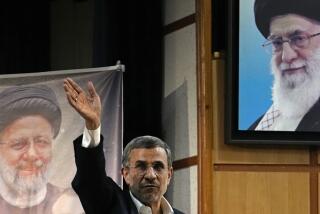Father of Pakistan’s nuclear weapons program becomes office seeker
ISLAMABAD, Pakistan — He’s a hero in Pakistan for founding the country’s nuclear weapons program, and a pariah in the West for relaying nuclear secrets to rogue states. On Wednesday, aides to A.Q. Khan announced that the retired scientist has become an office seeker in the cutthroat world of Pakistani politics.
The Election Commission has approved Khan’s request to register his party, the Movement for the Protection of Pakistan, for the national election slated for spring, said Rafiq Ghuncha, a top official in the new party. The organization was one of 19 new parties given the go-ahead to contest the election, which determines who will run the government.
It’s doubtful that Khan, 76, will be able to make much headway with voters. He’s been openly talking about his desire to jump into politics since August, and reaction from the media and the public has been lukewarm. The Movement for the Protection of Pakistan faces a crowded field of powerful, established parties, including President Asif Ali Zardari’s Pakistan People’s Party, former Prime Minister Nawaz Sharif’s PML-N party, as well as a potent new political force, Pakistan Tehreek-e-Insaf, led by former cricket legend Imran Khan.
Nevertheless, Khan, who lives in a heavily guarded compound in Islamabad, is revered by Pakistanis for his work in stewarding the development of a nuclear arsenal that reportedly has grown to an estimated 100 weapons, which Pakistanis see as a bulwark against archrival India’s nuclear program.
His aides say Khan is banking on his universal popularity within Pakistan to vault his political career.
“Because he’s known as a scientist and a hero, that message resonates strongly and easily with the people,” Ghuncha said. “He feels that because the present regime and past regimes haven’t been able to deliver to the nation, he has opted to lead the nation and guide it toward prosperity and socioeconomic development.”
After revealing in 2004 on Pakistani television his involvement in spreading nuclear weapons technology to Iran, North Korea and Libya, Khan was pardoned and largely confined to his home by then-President Pervez Musharraf. The U.S. has always regarded Khan as a proliferation risk, and through the years has unsuccessfully pressed Pakistani authorities to allow him to be questioned.
Officials ended his house arrest in early 2009, but his ability to move was still constrained. However, on Wednesday, Ghuncha contended that Khan is now able to travel within Pakistan relatively freely, though he still must always accompanied by a team of security personnel.
“He has been going to universities, colleges, institutions, chambers of commerce,” Ghuncha said. “We are approaching almost every part of the country.”
Ghuncha said Khan will not adopt the traditional tack in Pakistani politics of holding massive rallies in big cities to build support, and instead will focus his message on the country’s educated voters and its youth.
“We are developing with the help of Pakistan’s youth and its intelligentsia, though we are also approaching the common man,” Ghuncha said, “because the main thing we have to do is to communicate to people that we are there.”
ALSO:
Car bombs in Damascus kill at least 34 people
Yasser Arafat’s grave dug up in poisoning probe
Egyptians pour into Tahrir Square to protest presidential decree
More to Read
Sign up for Essential California
The most important California stories and recommendations in your inbox every morning.
You may occasionally receive promotional content from the Los Angeles Times.










